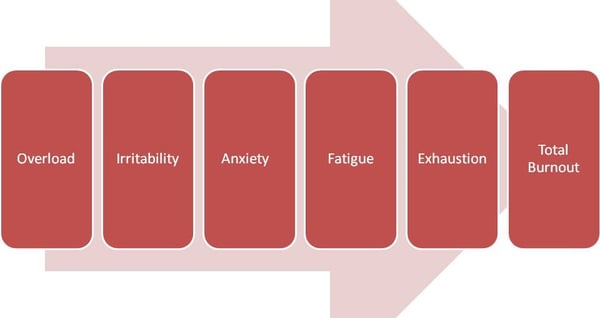5 Healthy Habits That Help Prevent Burnout
Anyone who feels overworked and undervalued is at risk for burnout- from the hardworking office worker who hasn’t had any time off, to the frazzled mom juggling working from home while tending to kids. Although burnout often stems from your job, the negative effects can spill over into all areas of life- including your home, work and social life. Burnout can also cause long-term changes to your body that make you vulnerable to illnesses like colds, flu and COVID-19. It’s important to know how to deal with burnout so if you do start to feel deflated, you can tackle it early on and avoid its long-term effects. In this post we’ll define what burnout is, explain why it’s important and provide ways to avoid it.
Most of us have days when we feel like dragging ourselves out of bed requires an enormous amount of effort, but what if you felt like that every single day? Burnout is defined as a state of emotional, physical, mental exhaustion caused by excessive and prolonged stress. It happens when you feel overwhelmed, emotionally drained and unable to meet constant demands.
Burnout is a gradual process. The signs and symptoms are subtle at first, but become worse as time goes on. If you pay attention to early symptoms and actively reduce your stress, you can prevent a major breakdown. If you choose to ignore them, you’ll eventually burnout. Here are five things you can do right now to avoid and/or deal with burnout.
1. Reframe the way you look at work.
For many of us, changing our job or career is far from being a practical solution. In today’s climate, we’re grateful just to have work that pays the bill. Here are some steps you can to improve your state of mind about work.
-
Try to find value in your work. Even in some mundane jobs, you can often focus on how your role helps others, for example, or provides a much-needed product or service. Focus on aspects of your job that you do enjoy, even if it’s just chatting with your coworkers at lunch. Changing your attitude towards your job can help you regain a sense of purpose and control.
-
Find balance in your life. If you hate your job, look for meaning and satisfaction elsewhere in your life: in your family, friends, hobbies, or volunteer work. Focus on the parts of your life that bring you joy.
-
Make friends at work. Having strong ties in the workplace can help reduce monotony and counter the effects of burnout. Having friends to chat and joke with during the day can help relieve stress from an unfulfilling or demanding job or simply get you through a rough day.
-
Take time off. Try to take a complete break from work. Go on vacation or use up your sick days. Use the time away to recharge.
2. Re-evaluate your priorities.
Burnout is a sign that something important in your life is not working. Take time to think about your hopes, goals and dreams. Are you neglecting something that is truly important to you? This can be an opportunity to rediscover what really makes you happy and to slow down and give yourself time to rest, reflect and heal.
-
Set boundaries. Learn how to say “no” in order to avoid overextending yourself.
-
Take a daily break from technology. Set a time each day when you completely disconnect. Put away your laptop, turn off your phone and stop checking your email.
-
Set aside relaxation time. Relaxation techniques such as yoga, meditation and deep breathing activate the body’s relaxation response, a state of restfulness that combats the stress response.
-
Get creative. Try something new, start a fun project, or engage in a favorite hobby. Choose activities that have nothing to do with work or whatever is causing your stress.
-
Get plenty of sleep. Feeling tired can exacerbate burnout by causing you to think irrationally. In order to function optimally, adults need 7-9 hours of sleep each night.
3. Support your mood and energy levels by eating a healthy diet.
What you put in your body can have a huge impact on your mood and energy levels throughout the day.
-
Minimize sugar and refined carbs. You might crave sugary snacks or comfort foods such as pasta or French fries, but these high-carb foods quickly lead to a crash in mood and energy.
-
Reduce your high intake of foods that can adversely affect your mood, such as caffeine, trans fats and foods with chemical preservatives or hormones.
-
Eat more Omega-3 fatty acids to give your mood a boost. The best sources are fatty fish (salmon, herring, mackerel, anchovies, sardines), seaweed, flaxseed and walnuts.
-
Avoid nicotine. Smoking when you’re feeling stressed may seem calming, but nicotine is a powerful stimulant, leading to higher, not lower, levels of anxiety.
-
Limit alcohol. Too much alcohol can cause increased levels of anxiety.
4. Make exercise a priority.
Although it may be the last thing you feel like doing when you’re burned out, exercise is a powerful antidote to stress and burnout. It’s also something you can do right now to boost your mood. Aim to exercise for 30 minutes or more per day or break that up into short, 10-minute bursts of activity. A 10-minute walk can improve your mood for up to two hours.
Rhythmic exercise, where you move both your arms and legs, is a highly effective way to lift your mod, increase energy, sharpen focus, and relax both the mind and body. Try walking, running, weight training, swimming, or even dancing.
Also, to maximize stress relief, instead of focusing on your thoughts, focus on your body and how it feels as you move: the sensation of your feet hitting the ground, for example, or the wind on your skin.
5. Turn to others.
Social contact and talking face-to-face with a good listener are some of the fastest ways to calm your nervous system and relieve stress. Here are some ideas.
-
Reach out those closest to you, such as your partner, family and friends. Most loved ones will be flattered that you trust them enough to confide in them, and it will only strengthen your relationship.
-
Be more sociable with your coworkers. Developing friendships with people you work with can help buffer you from job burnout. For example, when you take a break, instead of checking your smartphone, try engaging with a colleague.
-
Limit your contact with negative people. Hanging around negative-minded people who do nothing but complain will only drag down your mood and outlook. If you do have to work with a negative person, try to limit the amount of time you spend together.
-
Connect with a cause or a community group that is personally meaningful to you. Joining a religious, social or support group can give you a place to talk to like-minded people about how to deal with daily stress- and to make new friends.
Burnout is stressful, harmful and takes a toll on both your work and social life. However, you don’t have to get to that point! As long as you pay attention to your emotions and check in with yourself every once in a while, burnout is 100% avoidable. Remember to not only treat yourself with kindness and compassion, but take care of your physical health as well, and you’ll be on your way to leading a burnout-free life.


